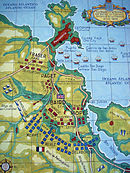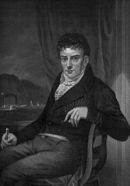- 1809
-
This article is about the year 1809.
Millennium: 2nd millennium Centuries: 18th century – 19th century – 20th century Decades: 1770s 1780s 1790s – 1800s – 1810s 1820s 1830s Years: 1806 1807 1808 – 1809 – 1810 1811 1812 1809 in topic: Humanities Archaeology – Architecture – Art – Literature – Music By country Australia – Canada – France – Germany – Mexico – South Africa – US – UK Other topics Rail Transport – Science – Sports Lists of leaders Colonial Governors – State leaders Birth and death categories Births – Deaths Establishments and disestablishments categories Establishments – Disestablishments Works category Works 1809
MDCCCIXAb urbe condita 2562 Armenian calendar 1258
ԹՎ ՌՄԾԸAssyrian calendar 6559 Bahá'í calendar -35–-34 Bengali calendar 1216 Berber calendar 2759 British Regnal year 49 Geo. 3 – 50 Geo. 3 Buddhist calendar 2353 Burmese calendar 1171 Byzantine calendar 7317–7318 Chinese calendar 戊辰年十一月十六日
(4445/4505-11-16)— to —己巳年十一月廿五日
(4446/4506-11-25)Coptic calendar 1525–1526 Ethiopian calendar 1801–1802 Hebrew calendar 5569–5570 Hindu calendars - Bikram Samwat 1865–1866 - Shaka Samvat 1731–1732 - Kali Yuga 4910–4911 Holocene calendar 11809 Iranian calendar 1187–1188 Islamic calendar 1223–1224 Japanese calendar Bunka 6
(文化6年)Korean calendar 4142 Minguo calendar 103 before ROC
民前103年Thai solar calendar 2352
Year 1809 (MDCCCIX) was a common year starting on Sunday (link will display the full calendar) of the Gregorian calendar and a common year starting on Friday of the 12-day slower Julian calendar.Events
January–March
- January 5 – The Treaty of the Dardanelles between Britain and the Ottoman Empire is concluded.
- January 10 – French Marshal Jean Lannes begins the Siege of Zaragoza.
- January 16 – Peninsular War – Battle of Corunna: The French were defeated by the British.
- February 3 – The Illinois Territory is created.
- February 8 – Franz I of Austria declares war on France.
- February 11 – Robert Fulton patents the steamboat.
- February 17 – Miami University (Ohio) is established on the township of land required to be set aside for it under the conditions of the Miami Purchase in 1794.
- February 20
- A decision by the Supreme Court of the United States states that the power of the federal government is greater than any individual state.
- The Siege of Zaragoza grinds to a halt as Jose Palafox surrenders. Over 60,000 had been killed on both sides in 41 days of street fighting.
- February 25 – Battle of Valls: Spanish forces are defeated in Catalonia by Marshal Laurent Gouvion Saint-Cyr.
- March 1 – Embargo Act repealed, Non-Intercourse Act replaces it.
- March 4 – James Madison succeeds Thomas Jefferson as the President of the United States.
- March 13 – A military coup ousts Gustav IV Adolf of Sweden; he is confined in the Gripsholm Castle.
- March 29
- At the Diet of Porvoo, Finland's four Estates pledge allegiance to Alexander I of Russia, commencing the secession of the Grand Principality of Finland from Sweden.
- King Gustav IV Adolf of Sweden abdicates after a coup d'état and is later exiled.
- First Battle of Porto: 18,000 Portuguese soldiers are drowned in a rout after defeat by the French under Marshal Soult and the Battle of Medellín results in massive Spanish casualties in Extremadura, when Marshal Victor's cavalry routs their army.
April–June
- April 9 – Tiroleans rise under the command of Andreas Hofer against French and Bavarian occupation.
- April 14 – Battle of Abensberg, Bavaria: Napoleon I defeats Austria.
- April 18 – The 2,000 Guineas Stakes horse race has its first run in England.
- April 19 – Battle of Raszyn: The armies of Austria are defeated by the Duchy of Warsaw as a part of the struggles of the Fifth Coalition (1809).
- April 22 – Battle of Eckmühl: French troops under Napoleon I and Marshal Davout defeat the Austrians under Archduke Charles.
- May 5
- May 10 – Gustav IV Adolf is officially deposed from the Swedish throne by the Riksdag of the Estates.
- May 17 – Napoleon I of France orders the annexation of the Papal States to the French Empire. When he announces that the Pope's secular power has ended, the Pope excommunicates him.
- May 21 – Battle of Aspern-Essling: Austrian troops under Archduke Karl beat the French under Napoleon in a hard fought battle.
- May 24 – Dartmoor Prison opens, the first to house French prisoners of war This is incorrect, the first purpose built prisoner of war camp for the Napoleonic wars was at Normans Cross which was built in December 1796 to March 1797
- June 6 – Sweden promulgates a new Instrument of Government, which restores political power to the Riksdag of the Estates after authoritarian rule since 1772. On the same day, Duke Charles (uncle of the deposed king Gustav IV Adolf) is elected King under the name Charles XIII.
- June 7 – Shoja Shah of Afghanistan signs a treaty with the British. Only weeks later, he is succeeded by Mahmud Shah.
July–September
- July 5–July 6 – Battle of Wagram: Napoleon defeats the Austrians.
- July 6 – French troops arrest Pope Pius VII and take him to Liguria.
- July 10 – French Marshal Marmont engages in the inconclusive Battle of Znaim against the Austrians.
- July 16 – The city of La Paz (current Bolivia) declares its independence from the Spanish Crown and forms the Junta Tuitiva, the first independent government in Spanish America, led by Pedro Domingo Murillo.
- July 28 – Battle of Talavera: Sir Arthur Wellesley's British, Portuguese and Spanish army defeats a French force.
- July 30 – A British invasion army lands in Walcheren.
- August 8 – 70 disciples of Gaon of Vilnius arrive in Palestine.
- August 10 – Ecuador declares independence from Spain.
- August 11
- Severe earthquakes strike the Azores and the village of São Miguel sinks.
- Battle of Almonacid de Toledo: A poorly led Spanish army is defeated by King Joseph Bonaparte's French army.
- September 17 – The Peace of Hamina is signed between Russia and Sweden in the Finnish War. The territory to become the Grand Principality of Finland is ceded to Russia by the Treaty of Fredrikshamn.
- September 18 – A new theatre to hold the Royal Opera House opens in London to replace the first, burnt down in a fire in 1808. The price increases lead to the Old Price Riots which last for 64 days.
October–December
- October 8 – Prince Klemens von Metternich becomes Austrian foreign minister.
- October 11 – Along the Natchez Trace in Tennessee, explorer Meriwether Lewis dies under mysterious circumstances at an inn called Grinder's Stand.
- October 14 – The Treaty of Schoenbrunn cedes the Illyrian provinces to France.
- November 10 – Berners Street Hoax: Theodore Hook manages to attract dozens of people to 54 Berners Street in London.
- November 19 – Battle of Ocana: A Spanish army is ridden down and 20,000 are killed by French forces.
- November 25 – Benjamin Bathurst, a British diplomat, mysteriously disappears (possibly murdered) in Perleberg.
- December 26 – A British invasion force leaves Vlissingen.
- December 30 – Wearing masks at balls is forbidden in Boston, Massachusetts.
Date unknown
- Thomas Rowlandson British cartoonist begins publishing his popular illustrations of the hapless country physician Dr Syntax in a London magazine. They depict comic and rediculus scenes and have come to represent British, Regency, cartoon Humour.
- The USS Constitution (Old Ironsides) is recommissioned as the flagship of the North Atlantic Squadron.
- Louis Poinsot describes the two remaining Kepler-Poinsot polyhedra.
- Jean-Baptiste Lamarck publishes Philosophie Zoologique, outlining the concept of evolution.
- Nicolas Appert develops a method to preserve food by means of canning.
- British recruits to the British East India Company and subsequently to the Indian Civil Service are required to learn at least one Indian language fluently.
Births
January–June
- January 1 – Cao Bá Quát, Vietnamese poet (d. 1855)
- January 4 – Louis Braille, French teacher, inventor of braille (d. 1852)
- January 15 – Cornelia Connelly, American founder of the Society of the Holy Child Jesus (d. 1879)
- January 15 – Pierre-Joseph Proudhon, French anarchist (d. 1864)
- January 19 – Edgar Allan Poe, American writer and poet (d. 1849)
- February 3 – Felix Mendelssohn, German composer (d. 1847)
- February 12
- Abraham Lincoln, 16th President of the United States (d. 1865)
- Charles Darwin, British naturalist (d. 1882)
- February 15 – Cyrus McCormick, American inventor (d. 1884)
- February 23 – William Sprague, American minister and politician from Michigan (d. 1868)
- March 24 – Joseph Liouville, French mathematician (d. 1882)
- March 27 – Georges Haussmann, French civic planner
- March 31 – Nikolai Gogol, Russian writer (d. 1852)
- April 15 – Hermann Gunter Grassmann, Prussian mathematician (d. 1877)
- June 4
- Columbus Delano, American statesman (d. 1896)
- John Henry Pratt, English clergyman and mathematician (d. 1871)
- June 8 – Richard Wigginton Thompson, American politician (d. 1900)
- June 20 – Isaak August Dorner, German theologian (d. 1884)
July–December
- August 6 – Alfred, Lord Tennyson, British poet (d. 1892)
- August 8 – Heinrich Abeken, German theologian (d. 1872)
- August 27 – Hannibal Hamlin, American politician (d. 1891)
- August 29 – Oliver Wendell Holmes, Sr., American physician and writer (d. 1894)
- October 22 – Volney E. Howard, American politician (d. 1889)
- September 27 – Raphael Semmes, Officer in the USN and the CSN (d. 1877)
- November 27 – Fanny Kemble, British-born American actress and writer (d. 1893)
- December 24 – Kit Carson, American frontiersman (d. 1868)
- December 29 – William Ewart Gladstone, Prime Minister of the United Kingdom (d. 1898)
- date unknown – Samuel Ajayi Crowther, 1st Black Anglican Bishop, pioneer linguist (d. 1891)
Deaths
January–June
- January 16 – John Moore, British general (killed in battle) (b. 1761)
- February 25 – John Murray, 4th Earl of Dunmore (Lord Dunmore)
- March 7 – Johann Georg Albrechtsberger, Austrian composer (b. 1736)
- March 11 – Hannah Cowley, English dramatist and poet (b. 1743)
- March 20 – Mary Bateman, English woman executed for witchcraft, known as the "Yorkshire Witch"
- March 25 – Anna Seward, English writer (b. 1747)
- March 27 – Joseph-Marie Vien, French painter (b. 1716)
- May 13 – Beilby Porteus, English bishop and abolitionist (b. 1731)
- May 17 – Leopold Auenbrugger, Austrian physician (b. 1722)
- May 31
- Joseph Haydn, Austrian composer (b. 1732)
- Jean Lannes, French marshal (mortally wounded in battle (b. 1769)
- June 4 – Nikolaj Abraham Abildgaard, Danish painter (b. 1743)
- June 8 – Thomas Paine, American revolutionary writer (b. 1737)
July–December
- July 6 – Antoine Charles Louis Lasalle, French cavalry general (killed in battle) (b. 1775)
- August 8 – Ueda Akinari, Japanese author and scholar (b. 1734)
- August 18 – Matthew Boulton, English manufacturer and engineer (b. 1728)
- October 8 – James Elphinston, Scottish philologist (b. 1721)
- October 11 – Meriwether Lewis, American explorer (suicide) (b. 1774)
- October 30 – William Cavendish-Bentinck, 3rd Duke of Portland, Prime Minister of the United Kingdom (b. 1738)
- November 9 – Paul Sandby, English cartographer and painter (b. 1725)
References
Categories:
Wikimedia Foundation. 2010.


